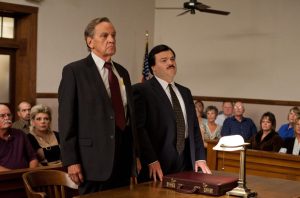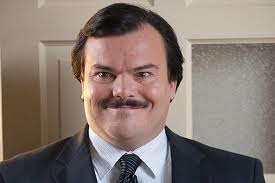
Suddenly, he appears from the mist; a mustached, well-tailored specter of near divine inspiration. His past is a mystery, both to us and his adopted town of Carthage, Texas, as if too much fact might derail the legend from its tracks. His canvas – blank yet inviting, undeniably odd while tinged with an unquestionable warmth that fosters connection, even if it’s more a matter of what an outsider brings than what he actually projects.
He is Bernie Tiede (Jack Black), a born salesman so gifted at his trade that his choice of the funeral business is less a professional turn than a fulfillment of prophecy. He’s more than a master of the up-sell; he all but wills the living into a desire for death, as if the corpse could sit back and admire the man’s handiwork from afar. He is patient, kind, calm, and engaged, and for the moment you are buying a casket, paying for a plot, or clasping his hand before the service of a loved one, he has blocked out the world entire for your needs. He grieves as you grieve, sobs as you sob, and with a voice like an angel, he sends the souls of the departed to a heaven so fine, you’ll wonder why you continue to mope around this mortal coil. And despite what appears to be an obvious snake in this oil, the men and women of this East Texas town have linked arms in a love lock only the Lone Star State could provide. Bernie belongs to them, and they’ll ride him through good times and bad, up to and including murder itself.
It is said that all Texas tales are tall, and with Bernie, writer/director Richard Linklater has unspooled an outsized narrative so ridiculous on its face that it can’t help but ring true. In many ways, this is the most authentic rumination on the Texas mindset ever released, helped mightily along by a Greek chorus of blue hairs, big hairs, and smoke-soaked ladies of such sweet deception that they have you at howdy, even as they’re grabbing for your throat. From what I hear, these are actual Carthage residents who knew the people involved, and it’s to Linklaters credit that he lets them carry on without the burden of self-editing. These are people who call ’em as they see ’em, which, in Texas-speak, carries the unmistakable threat of insult and disparagement. TheyÂll love you to death if you let them, but any unkindness will be met with a gossip so all-encompassing that it becomes as unavoidable as your DNA. Once tagged, escape is impossible. We learn much about Bernie from what we see, yes, but it’s the side commentary… the jokes, puns, and unique observations that flesh out the farce until it achieves a certain grandeur. In many ways, we come to love Bernie as we do almost as self-protection. God forbid we challenge these folks in the court of public opinion.

If this were simply a tale of yet another con artist fleecing the rubes, it would hardly rate a passing mention. But instead of simply updating Elmer Gantry, Linklater has dared to take a story we thought we all knew from the newspapers (and Texas Monthly) and enrich it with the flavors of sympathy, even compassion. Bernie eventually kills, yes, but given his philanthropic work, can’t we forgive and forget? Carthage loves this man… his wisdom, his love, and his generous spirit (so what if it’s with someone else’s money?)
And if he eventually loses a screw, perhaps it’s the fault of the victim, and not the cuddly conniver who, after all, donated a new wing for the church. The message is inescapable in certain communities (fine, pretty much small towns who, throughout their history, have rarely demonstrated an affinity for outsiders), slapping backs and pressing flesh are, in themselves, enough to erase even the most egregious of sins. Show up unexpectedly with flowers and baked goods, or volunteer to coach the little league, and perhaps, even after you’ve pumped four rounds into the back of a town spinster, you’ll be judged not by the single, atypical act, but rather by the months and years of good works that came before. Perhaps, against the odds, they’ll excuse homicide because, well, it’s the Christian thing to do.

Fortunately for Bernie, the victim of his murderous impulses is one Marjorie Nugent (Shirley MacLaine), a nasty rich widow who has fallen so far from grace that she no longer speaks to her children. She’s been sued, threatened, and berated, and when first encountered by Bernie, her lone contact with the outside world remains her financial advisor. She has money to burn (her late husband, no surprise, dabbled in oil), which makes her prime for the affections of Mr. Tiede. But is he simply after her riches? That Bernie is a homosexual is beyond dispute (taking the voice, walk, and affinity for musical theater into account, are we left with any choice?), but for some reason, the townspeople (and Mrs. Nugent) don’t seem to care.
Or, in a more likely scenario, Carthage residents are so oblivious to what homosexuality actually is (they’re working on talking points and rumors, after all) that they miss “the one” right under their noses. That seems logical enough, but I also suspect that Bernie is, to be blunt, “their gay”. As many Southern towns, even at the height of Jim Crow, had a few “acceptable” Negroes whom they condescendingly embraced as one of their own, it stands to reason that there would be the gay man who fit in solely because he worked so hard at it. And yes, the money helped.
Interestingly, Bernie, far from being a one-dimensional manipulator, appears to be little more than a man who appreciates the finer things in life. He loves to travel, so why not find someone with whom to travel? Sure, Marjorie paid for everything eventually signing over her entire fortune and power of attorney to Bernie, but isn’t it possible that she made that choice willingly? She was lonely, Bernie was great company, and well, isn’t that worth paying for? As with all relationships based on the cash nexus, however, the party with the wallet eventually turns cold, insisting on subservience instead of mere companionship.

Bernie quits the funeral business, moves in, and eventually freezes out Marjorie’s old financial guy, creating a new thread of resentment and suspicion. But was he really any better? His concern for Marjorie extended no further than the commissions she supplied, and at least Bernie was there in the evenings to provide a rub down. Like so many allegedly looking out for another’s best interests, the best way to ensure a spiteful rage is to insist that they “share” the object of their concern. And what about Marjorie’s ungrateful children taking the poor woman to court? Why is Bernie the bad guy in this scenario?
Eventually, Bernie snaps and plugs the old bat with what he calls “the armadillo rifle.” But how much is a man supposed to take? And, as a perturbed local insists, “It’s not like he shot her five times.” The real story points to a fearful Marjorie being killed just as she was getting wise to Bernie’s rampant theft, but for Linklater, the murder was little more than an unkind inevitability; the natural result of a sweet soul being pressed down too often by the hands of a truly unpleasant woman. Weighing the moral scales, isn’t it far better to be the sort who spreads joy than someone who uses her money to retain an iron grip on those who would otherwise flee in disgust?
Again, Bernie never bought anything for himself; he kept driving a junker and lived in the same modest abode as always and Carthage itself reflected the sunshine he brought to bear each and every day. Old people on the verge of death laughed a little more, did they not? He entertained like a court jester, and with Marjorie’s money (previously sitting in some icy vault, helping no one but Marjorie), the local economy thrived. He started businesses, created jobs, and made Carthage itself one of America’s most livable cities. Before and after Bernie, it is implied, no one much gave a damn. Rather than wasting away in prison, perhaps he should have been elected mayor.

As with all good rides on the dime of another, all comes crashing down in the months after the murder, even though Bernie was kind enough to keep her in a freezer, thereby preserving Marjorie for a proper preparation and burial. And let’s face it, if Bernie was really acting on a murderous plot to bilk the old woman of her fortune, why would he not choose a more reasonable method? There are any number of ways he could have made the death appear natural, but instead, he acted on pure impulse. And even though Bernie kept up the ruse of Marjorie’s “illness” for nearly a year after her death (it helped that she wasn’t well liked in town, so who on earth would come to visit?), he never contemplated leaving town, or making a major withdrawal, or even living high on the hog. He continued much as he always did, spreading love with a healthy supply of good fortune.
His was not a lust for money itself, but simply a desire to belong, where community, not cash, was of paramount importance. It’s what any outsider, or some ambitious, unfeeling district attorney (Matthew McConaughey) couldn’t possibly understand. For when Bernie’s luck runs out and the case comes to trial (40 miles outside of town, in fact, given that an acquittal in Carthage was expected), we can feel the life drain from the proceedings. Not the movie, mind you, but Carthage itself. They had a stake in this man, and his imprisonment took away the one thing they had to look forward to that wasn’t a potluck down at the VFW.

And let’s face it: people like Bernie, for all of their neediness and blind narcissism, add color to an otherwise drab world. Perhaps they are little more than carnival barkers in search of a center ring, but without them, life is reduced to sleeping, waiting, hoping, and death. Their winks and smiles have tragedy as a bookend, but what the hell doesn’t when everything we care about ends on a slab?
Americans, above all, love to be lied to, and we’re all a Harold Hill away from selling our own souls for that single scrap of pleasure. Bernie’s greatest crime, it seems, was his refusal to surrender to the ordinary. But unlike Marjorie and any number of enveloped saps behind walls of their own construction, Bernie lived; not simply or meekly, but out loud and with full effect. He was the can-do spirit writ large, the all-American boy made good, the man who would not go gently into that good night. It seems odd in the telling, but even when he took a life, he took it with love. People were counting on him. Promises had been made. Invoices were due. The performance, above all.